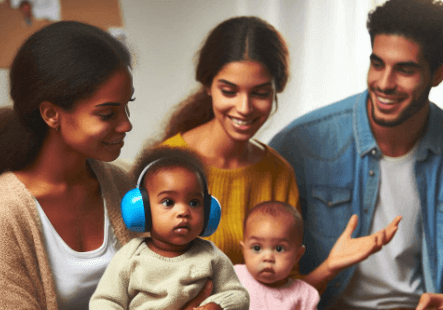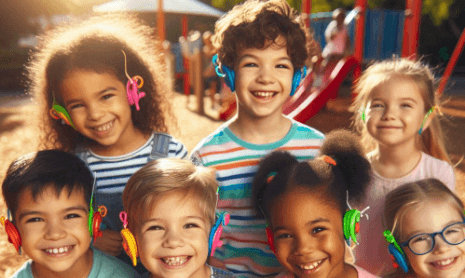Hearing loss in children can be a tricky thing. It’s more common than many people realize, affecting kids from all walks of life. This condition can stem from a variety of causes, including genetic factors, birth complications, and environmental influences.
Understanding hearing loss is super important for parents. Early detection and intervention can make a difference in a child’s development. By being aware of the signs and knowing what to do if you suspect your child has hearing loss, you can help them live their best life.
So, why should parents be invested in learning about hearing loss?
Well, the sooner you catch it, the better the outcomes. Effective treatment and support can dramatically improve a child’s communication, learning, and socializing skills. It’s all about giving your little one the best possible start.
Stick around as we explore the causes, symptoms, and impact of hearing loss in children and the various treatment options available.
Whether you’re a parent, guardian, or just someone who cares about kids, this guide has got you covered!
What Are The Causes of Hearing Loss in Children?
Understanding how hearing loss happens in kids is key.
Let’s break down the main causes so parents can stay informed and proactive.

Genetic causes are a big one.
If hearing loss runs in the family, there’s a chance it might affect new generations. Genetic tests can give you a heads-up if this is something to watch out for.
Birth complications can also lead to hearing issues.
Conditions like premature birth, low birth weight, or infections during pregnancy can result in hearing loss for a newborn. Keeping a close eye on your baby’s health right from the get-go helps catch potential problems early.
Infections and illnesses play a significant role, too.
Things like meningitis, measles, or chronic ear infections can damage a child’s hearing. Vaccinations and prompt medical care for illnesses are crucial in preventing these complications.
Personal reveal. I was told by my parents that when I was a baby, I was a very sick child. There was a point when I was severely dehydrated even though they were giving me an IV they had to administer fluids into my brain.
Anyway, it was during this time, that I contracted viral meningitis and suffered complete hearing loss in my right ear. Fast forward to today, my left ear got that tinnitus as well as hearing loss. Feel free to learn more about me here.
Exposure to loud noises is another factor.
Consistently being around loud sounds, whether it’s from loud toys, music, or noisy environments, can affect hearing. It’s essential to maintain a quieter environment and use hearing protection when needed.
There are also various environmental factors.
Exposure to certain chemicals, or even certain medications, can pose risks to your child’s hearing. Always consult your pediatrician about any medicine your child is taking.
Recognizing these causes helps in early detection and prevention. Staying informed can protect your child’s hearing health and ensure they get the help they need if issues arise.
Recommended Reading: 6 Signs of Hearing Loss You Should Not Ignore
How To Go About Recognizing Symptoms of Hearing Loss?
Recognizing signs of hearing loss early on can be a game-changer.
In the early stages of a child’s life, parents should stay vigilant for any unusual behavior that might hint at hearing problems.

For infants, missing milestone moments can be a red flag.
Examples include not reacting to loud sounds, not turning toward a source of sound, or not being able to recognize familiar voices.
If your baby isn’t babbling by around six months or doesn’t respond to their name by 12 months, it could signal hearing issues.
With older children, some signs are more apparent.
They might have trouble following directions, frequently turn up the volume on electronic devices, or display delayed speech development. Struggling in school or being socially withdrawn can also be indicators.
Early detection is key for addressing hearing loss effectively.
Regular hearing screenings are essential. Many schools conduct screenings, but parents should also request them during routine pediatric visits. Trust your instincts. If something feels off, act on it.
Monitoring your child’s hearing at home doesn’t require fancy equipment.
Make a habit of observing how they react to everyday sounds. Clap your hands, speak from different parts of the room, or use noise-making toys to test their responses. Keep records of any concerns to share with healthcare providers.
Spotting these symptoms early can lead to timely treatment, which helps in long-term development. It’s all about catching it early and getting the necessary support for your child.
Recommended Reading: Best Hearing Exercises To Improve Listening Skills
What is the Impact Of Hearing Loss on Children and Parents?
Hearing loss doesn’t just impact a child’s ability to hear; it spills over into multiple areas of their life.
It can make social interactions challenging. Kids might miss out on conversations, jokes, or important instructions. Feeling left out can lead to frustration and loneliness.
Academically, children with hearing loss may struggle to keep up with their peers.
They might lag in speech and language development, which can affect reading and writing skills. This often translates to lower grades and a less enjoyable school experience. Specialized learning plans can help, but it requires awareness and collaboration.
Emotionally, hearing loss can be tough on children.
They may struggle with feelings of inferiority or embarrassment. Parents must be supportive, foster self-esteem, and create an environment where the child feels safe discussing their challenges.
For parents, it’s a heavy emotional burden, too.
Guilt, worry, and helplessness are common feelings. Seeking support from other parents in similar situations or joining support groups can provide relief and practical advice.

Families can cope together by being open about the challenges and supporting one another. Celebrate small victories and encourage open communication.
The journey is easier when everyone is on the same team.
Getting Help For Children With Hearing Loss: Treatment Options
There are many ways to address hearing loss in children, and the earlier you start, the better.
Modern technology and medical advancements offer various solutions.

Hearing aids are often the first step. These small devices amplify sound, making it easier for kids to hear. They come in different styles and can be customized to fit comfortably. Regular check-ups ensure they work correctly.
Medications can sometimes treat hearing loss, especially if it’s related to infections or other medical conditions.
Always consult with a healthcare provider for the best course of action and to understand potential side effects.
In some cases, surgery might be needed. Procedures like ear tube insertion or reconstructive surgeries can help improve hearing. Discuss with an audiologist or ENT specialist to understand the options and what’s best for your child.
Cochlear implants are another option, especially for severe hearing loss. These devices are surgically implanted and work by directly stimulating the auditory nerve. They can be life-changing but require careful consideration and follow-up therapy.
Therapies and support services play a crucial role. Speech therapy, auditory training, and counseling can help children adapt and thrive. Schools often offer special programs and resources, so take advantage of these services.
Getting help early makes a significant difference. Explore all available options with your healthcare provider to find the best fit for your child.
Knowledge is power, and staying informed enables you to make the best decisions for your family.
>>Check Out Some Hearing Aids That You Can Buy Here<<
Living with Hearing Loss: Tips for Parents and Children
Parenting a child with hearing loss comes with unique challenges, but there are plenty of ways to support your child’s growth and development.
Creating a positive environment at home is a great start. Encourage open communication and be patient as they navigate new situations.
Supporting your child’s development involves working closely with their educators and healthcare providers. Establish a routine that includes regular check-ins and therapy sessions. Consistency and structure can make a big difference in helping your child adapt.
A conducive learning environment is vital. Ensure your child has access to the necessary tools and resources, like hearing aids or classroom accommodations. Speak with their teachers about seating arrangements, using visual aids, and other strategies that can help. This collaboration makes the learning process smoother and more effective.
Building social skills is also essential. Facilitate opportunities for your child to engage with peers, join clubs or teams, and participate in social activities. Activities that foster communication and interaction will boost their confidence and help them feel included.
Don’t forget about yourself.
Joining support groups or talking to other parents in similar situations can provide emotional relief and practical insights. It’s important to take care of your well-being while supporting your child.
Resources for families dealing with hearing loss are plentiful.
Look for local organizations, online forums, and community services that offer guidance, financial aid, and educational materials. Leveraging these resources can lighten the load and provide valuable assistance.
Living with hearing loss can be challenging, but it’s manageable with the right strategies and support.
By fostering a nurturing environment and advocating for your child’s needs, you can help them lead a fulfilling and successful life.
Conclusion and Final Thoughts
Navigating the journey of hearing loss with your child comes with its ups and downs, but being informed and proactive can make all the difference.
The key is early detection and intervention, staying attuned to your child’s needs, and leveraging available resources to support their development.
Your child can thrive with the right help, tools, and strategies.
Regular hearing checks, using the right hearing aids or medical treatments, and providing a loving, patient environment are essential steps.
Talk to healthcare professionals, connect with support groups, and take advantage of educational resources to pave the way for your child’s bright future.
Encourage your child every step of the way. Celebrate their achievements, no matter how small.
As they grow, their resilience and ability to adapt will amaze you. With your support, they can overcome the challenges of hearing loss and succeed in all aspects of life.
Parenting a child with hearing loss can be challenging, but it’s a journey filled with growth, learning, and endless possibilities.
In my case, it made a huge difference knowing that I have the support of family and friends. Even today as we speak, in my work environment, I have a supportive work crew and even the customers who come into the pharmacy are understanding.
Knowing that someone is genuinely there for you makes all the difference in the world. So be there for your children, support them and listen to them.
They will treasure it.
Take care
Roopesh
